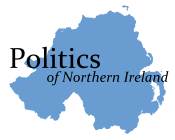Northern Ireland Office
The Northern Ireland Office (NIO; Irish: Oifig Thuaisceart Éireann,[3] Ulster-Scots: Norlin Airlann Oaffis)[4] is a UK Government department responsible for Northern Ireland affairs. The NIO is led by the Secretary of State for Northern Ireland and is based at Stormont House in Belfast and 1 Horse Guards Road in London.
 | |
 | |
| Department overview | |
|---|---|
| Formed | 24 March 1972 |
| Preceding Department |
|
| Jurisdiction | Northern Ireland |
| Headquarters |
|
| Employees | 167 (September 2011)[1] |
| Annual budget | £23 million for 2011–12[2] |
| Minister responsible | |
| Department executive | |
| Website | www.gov.uk/nio |
 |
|---|
| This article is part of a series on the politics and government of Northern Ireland |
a Lowercase "d" per here. |
|
Northern Ireland in the UK
|
|
|
Role
The NIO's role is to "maintain and support" the devolution settlement resulting from the Good Friday Agreement and St Andrews Agreement and the devolution of criminal justice and policing to the Northern Ireland Assembly.[5] The department has responsibility for:
- electoral law
- human rights and equality
- national security in Northern Ireland
- the British government's approach to the legacy of the Troubles
It also represents Northern Irish interests at UK government level and the interests of the UK Government in Northern Ireland.[6]
The Northern Ireland Office has a close working relationship with the Irish government as a co-guarantor of the peace process; this includes the British-Irish Intergovernmental Conference and its joint secretariat.[7]
In the Irish Government, the NIO's main counterparts are:
- the Department of Foreign Affairs (on the peace process);[8]
- the Department of the Taoiseach (supporting the role of the Taoiseach in the peace process);[9]
- the Department of Justice and Equality (on national security matters and the legacy of the Troubles);[10][11]
- the Department of the Environment, Community and Local Government (on electoral law).[12]
History
Before partition, Ireland was governed through the Dublin Castle administration and the Home Office was also responsible for Irish affairs. From 1924 to 1972, Northern Ireland affairs were handled by the Northern Ireland Department of the Home Office.[13] In August 1969, for example, Home Secretary James Callaghan approved the sending of British Army soldiers to Northern Ireland.[14]
As the Troubles worsened, the UK Government was increasingly concerned that the Northern Ireland Government (at Stormont) was losing control of the situation. On 24 March 1972, it announced that direct rule from Westminster would be introduced. This took effect on 30 March 1972.[15]
The formation of the NIO put Northern Ireland on the same level as Scotland and Wales, where the Scottish Office and Welsh Office were established in 1885 and 1965 respectively. The NIO assumed policing and justice powers from the Ministry of Home Affairs. NIO junior ministers were placed in charge of other Northern Ireland Civil Service departments.
Direct rule was seen as a temporary measure, with a power-sharing devolution preferred as the solution. Under the Northern Ireland (Temporary Provisions) Act 1972, the Secretary of State for Northern Ireland replaced the Governor of Northern Ireland and direct rule was annually renewed by a vote in Parliament.[16]
The Sunningdale Agreement in 1973 resulted in a brief, power-sharing Northern Ireland Executive, which was ended by the Ulster Workers' Council strike on 28 May 1974. The Northern Ireland Constitutional Convention (1975–1976) and Northern Ireland Assembly (1982–1986) were unsuccessful in restoring devolved government. After the Anglo-Irish Agreement on 15 November 1985, the UK Government and Irish Government co-operated more closely on security and political matters.
Following the Belfast Agreement (also known as the Good Friday Agreement) on 10 April 1998, devolution returned to Northern Ireland on 2 December 1999. The Northern Ireland Executive was suspended on 15 October 2002 and direct rule returned until devolution was restored on 8 May 2007.
The devolution of policing and justice powers on 12 April 2010 transferred many of the NIO's previous responsibilities to the Northern Ireland Assembly and its devolved government, the Northern Ireland Executive. The Department of Justice is now responsible for those matters. This transfer of power resulted in a smaller Northern Ireland Office, comparable to the Scotland Office and Wales Office.
Ministers
The NIO ministers are as follows:[17][18]
| Minister | Rank | Portfolio |
|---|---|---|
| The Rt Hon. Brandon Lewis MP | Secretary of State | Overall responsibility; Political stability and relations with the Northern Ireland Executive; National security and counter-terrorism; Implementation of the Stormont House and Fresh Start Agreements, including legacy of the past; Representing Northern Ireland in the Cabinet on EU exit, including new economic opportunities; International interest in Northern Ireland, including relations with the Irish government. |
| The Rt Hon. Robin Walker MP | Minister of State for Northern Ireland | TBD |
As Attorney General for England and Wales, The Rt Hon. Suella Braverman MP is Advocate General for Northern Ireland, advising the UK Government on Northern Ireland law.
Permanent Secretary
The senior civil servant in the NIO is Madeleine Alessandri, who replaced Sir Jonathan Stephens in February 2020. She was formerly the Prime Minister’s Adviser on National Resilience and Security.
See also
- Northern Ireland Affairs Committee
- Northern Ireland Assembly
- Northern Ireland Executive
- Department of Justice
References
- "Northern Ireland Quarterly Employment Survey Historical Data". Department of Enterprise, Trade and Investment. Retrieved 28 December 2011.
- Spending Review 2010 (PDF). London: HM Treasury. 2010. p. 88. Archived from the original (PDF) on 22 November 2010. Retrieved 28 December 2011.
- "Northern Ireland Office". téarma.ie – Dictionary of Irish Terms. Foras na Gaeilge and Dublin City University. Retrieved 18 November 2016.
- Tha Owersman fur tha Polis Archived 16 July 2012 at the Wayback Machine Police Ombudsman for Northern Ireland.
- "Government ministers and responsibilities". GOV.UK. Retrieved 15 November 2018.
- Northern Ireland Office, About the NIO Archived 17 September 2010 at the Wayback Machine
- Melaugh, Martin. "British-Irish Intergovernmental Conference (BIIC)". Conflict Archive on the Internet (CAIN). University of Ulster. Retrieved 15 October 2011.
- "Northern Ireland - Department of Foreign Affairs and Trade". www.dfa.ie. Retrieved 15 November 2018.
- "Department of the Taoiseach: Northern Ireland". Retrieved 15 November 2018.
- Equality, The Department of Justice and. "Terrorism". www.justice.ie. Retrieved 15 November 2018.
- Equality, The Department of Justice and. "Northern Ireland". www.justice.ie. Retrieved 15 November 2018.
- Stuart-Mills, Ian (18 December 2015). "Voting - General". Retrieved 15 November 2018.
- "Home Office". National Archives Catalogue. National Archives. Retrieved 15 October 2011.
- Melaugh, Martin. "The Deployment of British Troops – 14 August 1969". Conflict Archive on the Internet (CAIN). University of Ulster. Retrieved 15 October 2011.
- Melaugh, Martin. "A Chronology of the Conflict – 1972". Conflict Archive on the Internet (CAIN). University of Ulster. Retrieved 15 October 2011.
- "Northern Ireland (Temporary Provisions) Act 1972" (PDF). Retrieved 15 November 2018.
- "Our ministers". GOV.UK. Northern Ireland Office. Retrieved 1 August 2019.
- "Her Majesty's Official Opposition". UK Parliament. Retrieved 17 October 2017.
.svg.png)